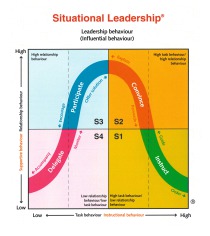New Leadership, New Learning, New Work?
For a long time, the topics of New Work and New Leadership were regarded as purely HR issues. But it is becoming increasingly clear that companies have to address them because their environment and their markets are undergoing fundamental change.
For some years now, the topic of “New Work” has been the subject of lively debate in society as well as in companies – partly because a generational change is taking place in companies: The so-called baby boomers are increasingly leaving them and members of the so-called generations Y and Z are taking their place or, in some cases, even already taking the helm.
These “digital natives”, i.e. women and men who grew up with the Internet and smartphones as well as social media, often have different wishes and expectations regarding their work than their older colleagues. And companies have to respond to this, whether they like it or not – also because of the shortage of specialists and managers.
The pandemic showed: Other forms of collaboration are possible
One amplifier of this development was the Covid-19 pandemic. Among other things, it made changes in collaboration necessary due to the current contact restrictions, such as increased work in the home office linked with increased virtual co-operation and communication. In-house training also increasingly took place digitally.
This made it possible for employees to experience that other forms of (collaborative) work and learning than the traditional ones are possible, if desired. This also changed their expectations. This is one of the reasons why many of the changes initially brought about by Covid are now irreversible.
Most companies see it that way, too. This is shown, among other things, by the latest Leadership Trend Barometer of the Institute for Leadership Culture in the Digital Age (IFIDZ). 177 executives took part in this online survey at the beginning of 2023. Of them, 75% were of the opinion: Dealing with the topic of New Work is not a “nice to have” matter for companies; rather, it is a necessity due to the changed framework conditions.
It is not just employees’ expectations that have changed
What is striking here: Only 14% of executives see dealing with the topic of New Work primarily as a reaction by companies to the changed expectations and needs of Generations Y and Z. In their opinion, the reasons for this are much more complex and profound.
In the in-depth, personal interviews that IFIDZ conducted with about one fifth of the survey participants, they repeatedly pointed this out: The needs and expectations of our customers have also changed so massively as a result of the perceived omnipresence of the Internet and social media, among other things, that work in the companies has to be restructured in some cases. And this need will continue to grow.
Increased use of AI will further increase the need for change
The majority of executives are convinced of this. In the interviews, they repeatedly pointed out, for example, that the general, free-of-charge use of the ChatGPT chatbot, which has been possible since November 2022, has also made many top decision-makers in the companies aware of the opportunities for redesigning many processes that artificial intelligence already offers their organization today. That is why they expect:
The need for change and learning in companies will continue to increase.
In the future, AI systems will increasingly be used in them and, as a result, numerous business processes will also be restructured. And:
As a result, in addition to the tasks of many employees, particularly in the market-related areas of companies, the demands on them will also change massively.
The topics of New Work and New Leadership are interlinked
Despite these serious changes that many companies or divisions are likely to face in the coming years, 62% of the executives surveyed are convinced that New Work is “primarily a culture issue and less a structure issue”. In addition, due to advancing digitization and the challenges they face in the VUCA world (Volatility, Uncertainty, Complexity and Ambiguity), which is characterized by rapid change and decreasing predictability, companies must fundamentally rethink not only their HR policies, but also their action and problem-solving strategies. And the resulting need for change must be communicated to employees in their day-to-day work. This is why the majority of managers (72%) see the topic of New Work as being inextricably linked with the topic of New Leadership.
In general, the executives are convinced that the importance of leadership in companies will continue to increase in the coming years – also because, due to the many imponderables, no one currently knows where the journey will lead in the medium and long term. She is convinced that this will also change the function of managers. In their day-to-day work, they are increasingly in demand as “meaning creators” and “relationship managers” who offer their employees orientation and support in a situation in which everything seems to be constantly under scrutiny. One of their core tasks is increasingly to maintain team spirit in an environment characterized by rapid change and to build a relationship of trust with their employees – so that they are willing to follow them.
Providing managers with support in matters of new work and leadership
Many managers are still extremely uncertain about what this means in concrete terms for their leadership behavior in everyday work. They still experience themselves strongly as seekers, not only when it comes to designing the structures of future collaboration in their team, but also when it comes to shaping the relationship with their employees.
Accordingly, it is important for companies to create forums in which managers can discuss such forward-looking questions as:
What changes in collaboration will still be necessary in our organization in the near future due to, among other things, increased use of AI and ever more rapidly changing customer needs? And:
What does this mean for my employees and me as a leader.
Because only if the managers themselves have a certain orientation can they give their employees the desired support and the necessary orientation – and accompany them in their learning processes in a supportive manner. Moreover, only then can they set the course for the future in their area.






